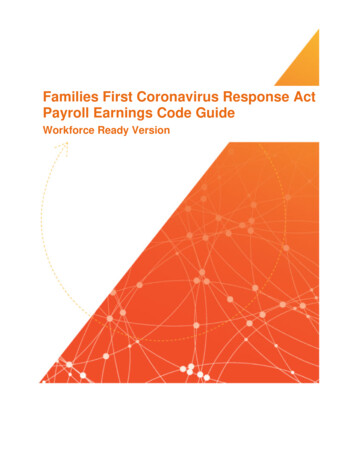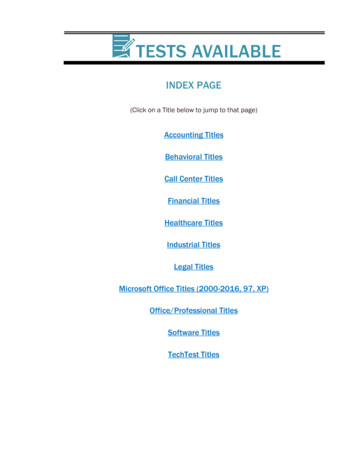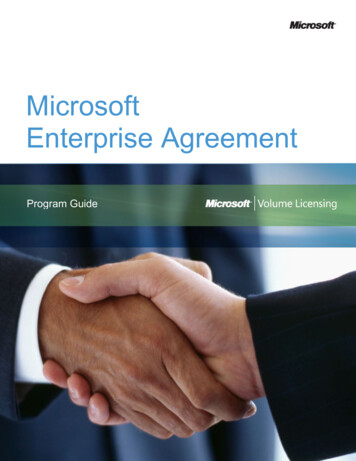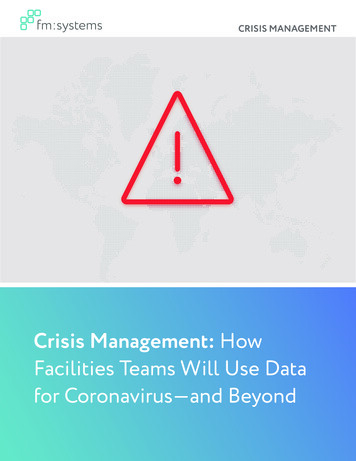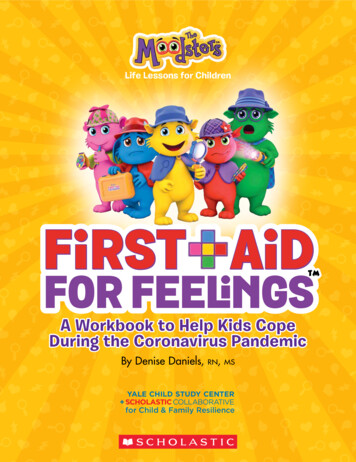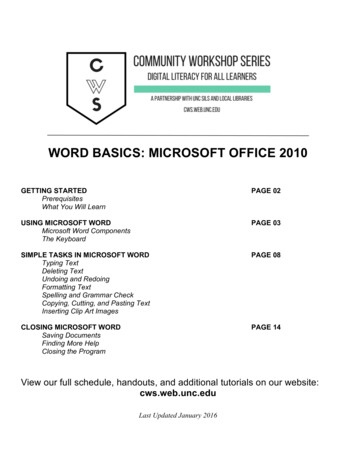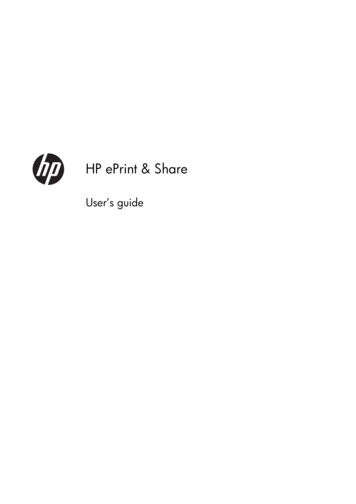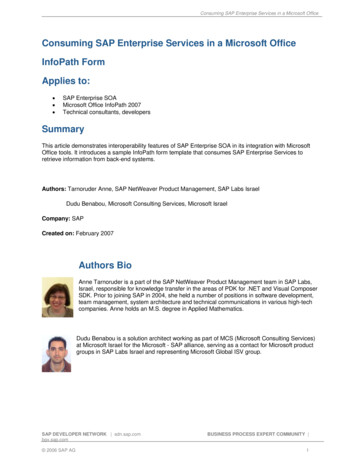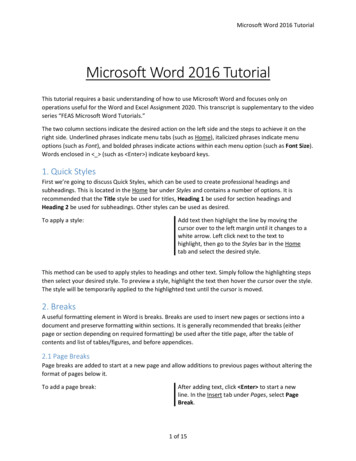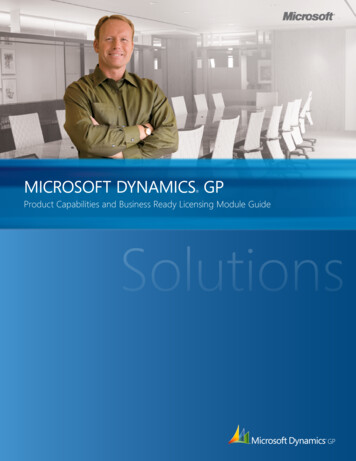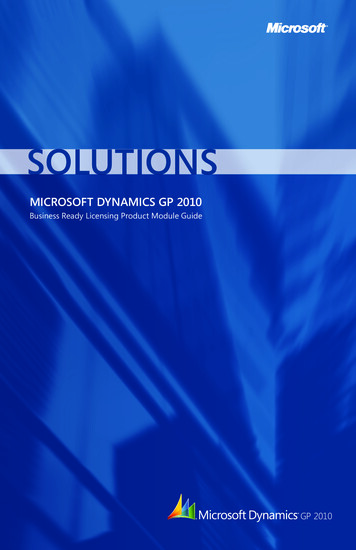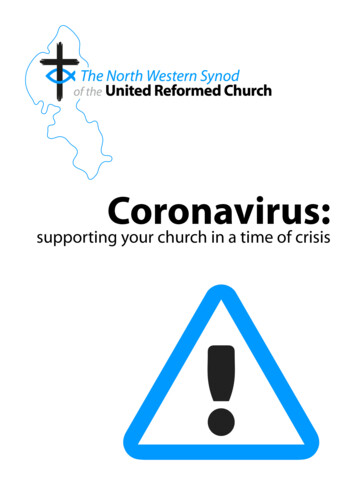
Transcription
Coronavirus:supporting your church in a time of crisis
A prayer:from the General SecretariatLord Jesus,In the midst of a storm,You said, ‘Peace be still.’Bid our anxious fears subside,sustain your church in faith, hope and love,bring our nation through this tumult.Grant wisdom to those with heavy responsibilities,and healing and hope to those who are infected,Amen.John Proctor - General SecretaryJane Baird, Francis Brienen, Richard Church - Deputy General Secretaries2
ContentsPastoral Letter:a pastoral letter from our Synod Moderatorp5Introduction:office closures and the purpose of this Handbookp6Digital Worship:Sunday Services, Daily Devotions, and prayer for all ages.p7Buildings:the practical implications of closing our church buildingsp8Finance:income, M&M, and cash flow issues - how we can helpp10Safeguarding:keeping people safe during the current crisisp14Personal Safety:lone worker guidance, and permission to stay safep19Funeral Services:advice on holding a funeral service safelyp20Ministerial Support:for every local churchp21Synod Contact Information:inside back cover3
4
Pastoral Letter:19 March 2020From Brian Jolly, Synod ModeratorDear friendsAs we face the unprecedented challenges of the moment, locally andglobally, I write to remind and assure you that we face these things together,with fellow pilgrims in the United Reformed Church and in the local andworldwide ecumenical movement, and in partnership with members ofother faiths and all people of goodwill.We can face uncertainty with faith. The psalmist assures us, God is our refugeand strength, a very present help in trouble [Psalm 46:1]. Jesus promises us, Iam with you always [Matthew 28.20]. Although we may have to celebrateEaster in our homes and with ongoing uncertainty about the future, thetruth of the resurrection will be undiminished by whatever we face.Please be assured of our common concern and support for one another, ofour prayers for one another and especially for those who face the greatestchallenges in our families, communities and world. As you are able, pleasecare for folk in your community in whatever ways are possible, in the nameof Jesus.Yours, in prayer and fellowshipBrian5
Introduction:The Synod Office is currently closed.However, all synod office-based staff are continuing to work from home. Wewill review this matter each week and advise you when any further change isto be made.During usual office hours the synod office phone line [0161 789 5583]will be diverted to a member of staff working at home.Please do not hesitate to ring the office if you require help or advice.Alternatively, call or email one of our officers or staff direct[their contact details are given on the inside back cover of this booklet].Items posted to the synod office will be collected several times each weekand dealt with as promptly as possible.Church House London is currently closed.However, staff are still working from home and can be contacted on theusual numbers and email addresses.This booklet brings together all the current information your churchesshould need to continue operating during the coronavirus pandemic, as wellas links to all the latest information and resources.6
Digital Worship:Sunday ServicesFull Sunday services are available online from the United ReformedChurch’s Daily Devotions website each week.In addition, a comprehensive list of all local United Reformed Churchesoffering live streamed services, sermon podcasts, recorded YouTube services,audio files of services and sermons, and other digital worship resources hasnow been published and can be accessed here: URC Digital Worship.Daily DevotionsThe Daily Devotions website also offers a daily Biblereading, reflection and prayer. Visit the Daily Devotionswebsite to read or listen to each days devotion, or tosubscribe to them if you would like them sent by emaileach morning, directly to your inbox.Alternatively, the URC’s Daily Devotions can also be found on Facebook.Prayer ands Bible StudyA simple cycle for daily prayer can be downloaded here and prayers forchildren and young people can be found here. You may also wish to holdbible study groups via group video chat providers.Technical HelpVisit the Information Guides page on the URC website for guidance aboutusing the various kinds of digital media in your online worship, and to keepin touch with members and friends of your church.You can follow the URC on Facebook and Twitter for updates, ideas andresources, as well as via the homepage of the URC website www.urc.org.uk.* The writers, editors and those that record the services and devotions are all volunteers fromacross the United Reformed Church, encompassing our rich variety of theology and worship styles.7
Buildings:Closure of Church BuildingsThe UK Government guidance for local churchesis that religious gatherings should cease to meet.The elders’ meeting of a local church [or equivalentbody in LEPs] are responsible for implementing this.Essentially, all local church buildings should be closeduntil further notice, for all church activities and room hire,with the exception of the following three purposes.Funerals: Funeral services may take place in our churches if requiredwith a small congregation of immediate family only (or carers if required,or a friend if no family members are attending). Two metres (approx 6feet) should be maintained between every household group throughoutproceedings. This may require arranging chairs differently or closing offsome pews.Digital Worship: A minister of religion is permitted to go to their placeof worship to broadcast or record an act of worship to people outsidethe place of worship, whether over the internet or otherwise.Essential Public Services: For the purpose of hosting essentialvoluntary or public service, such as food banks, homeless services, andblood donation sessions.If your church building is required for essential services please see theURC Website for the most up-to-date guidance regarding what churchpremises may be used for. This page is very helpful and is updated on aregular basis as national guidance changes.If you do have essential groups that are continuing to meet, pleaseensure that they know thy are responsible for cleaning the premisesbefore they leave.Your church buildings should not be open or usedfor any other purpose until the UK Governmentinforms us it is permissible to do so.8
InsurancePlease make certain you inform you insurers of the changes in your churchbuildings use, and seek their guidance on how to ensure that the premisesare safe and secure. The Synod Trust Officers fully support the guidanceprovided by the insurance companies but, do remind you to also ensure thatyou comply with government guidance in relation to Covid-19 and socialdistancing. It may be possible that Elders/Members may check at least theoutside of the buildings when on their daily walk. If you are inspectingbuildings internally please ensure that you follow loan working guidance(please see Personal Safety section later in this booklet).Room HireMany churches will have groups that use theirrooms under room hire agreements. Theseagreements do not make provision under thecurrent unprecedented circumstances forsuspension of activity. However, the groups willhave to stop meeting in line with Covid-19government regulations and are unlikely to beable to afford to continue to pay the hire fee. Itis likely that individual Churches will wish forthese groups to continue when things returnto n o r m a l, c h u rc h e s s h o u l d h ave aconversation with the groups and then confirmin writing to ensure that they will be able to return tonormal when allowed to do so under government guidelinesacknowledging that churches do not expect groups to pay for roomhire during this period.Should room hire agreements be terminated for any other reason then, theyshould do so in the normal way in line with the agreement.If you have any questions or concerns regarding your premises, please donot hesitate to contact us and if we do not know the answer we will do ourbest to find out for you.Jean MullineuxSynod Resources Committee Convenor9
Finance:The Coronavirus crisis and its financial implicationsThe priority for all of us at this difficult time is to lookafter ourselves, our families, our local church fellowshipsand the communities that we serve. However, for some of our churchesfinancial concerns are an added worry. This letter aims to help you with someof the financial implications of the current crisis.Rental IncomeMost local churches will lose rental income from groups that are notmeeting. For some congregations this will be very significant. There is littlethat can be done about this until the crisis has passed, but we dounderstand.Maintaining income from personal givingFor each and all of us, our personal giving to our local church is anexpression of our discipleship and this income is vital to the church locallyand across our three nations, and to all the work that we do together inChrist’s name. People need to be gently reminded that the financial needsof the church continue whether or not the congregation is meeting and thatour responsibility to support it continues as well.Some individuals and families will suffer serious financial hardship as aconsequence of this crisis and we need to be sensitive to that and supportthose people as we are able. But there may be others who could increasetheir regular giving during this crisis period and they need to be encouragedto do so.There are some practical ways in which we can try to maintain giving:people who are not already doing so should be encouraged to usestanding orders or bank transfers;others should be encouraged to set aside their weekly offerings andarrangements should be made through your pastoral supportnetworks to collect this money regularly and deposit it into the bank.10
Possible Insurance RecoveryIt seems unlikely that churches will be able to claim on their insurance forsome of their lost income. Those using Edwards Insurance Brokers willreceive some guidance from them in the next few days. Others shouldconsider contacting their insurers about this.Contributions to the Ministry and Mission FundThe Ministry and Mission Fund is the means by which local churches providethe finance which pays for all URC ministers – training, stipends, pensions,etc., and the other Assembly / Church House costs – Walking the Way,Stepwise, Children and Youth Work, Mission, governance, etc. Local churchescontributed a staggering 18.8 million in 2019.We recognise that, during this crisis, some local churches may not be able tomeet the M&M commitments they have made for 2020. If this applies toyour church, then:BEFORE contacting Church House to amend your M&M direct debit, pleasecontact the Synod Office so that we can look into your situation and see ifthere are alternative measure we can take to support your Church. Thefollowing pages from the Synod finance team outline how we hope tosupport those churches with cash flow and other finance problems.Please remember that simply cancelling your Direct Debit does not absolvethe local church of its responsibility to pay its assessed contribution to theMinistry & Mission Fund.Please be assured that the URC Trust does have sufficient cash to cover thepayment of stipends, salaries, pensions and other bills for several months.If the health crisis does continue for longer, and if there is a substantial dropin M&M income, then we may need to talk to colleagues in the synods aboutproviding some short-term support.The M&M office will maintain its regular contacts with colleagues in theSynods. When the health emergency is passed, we will assess the situationand talk together about how to fill whatever gap in M&M income hastranspired. We are confident that, together, we have the financial resourcesto deal with this but it is something to talk about later not now.11
Cash flow and other monetary issuesWe know that some churches are anxious about their financial stability,which for some will be intensified as income from freewill offerings andlettings drop. We appreciate that cashflow will be problematic for some, andthere may be some concern about whether the church can continue to paymeet their M&M pledge or pay locally employed staff.Synod and Church House officers have consider what arrangements mightbe put in place for local churches facing financial crisis. If your church has aparticular difficulty, we would like to know about it sooner rather than laterin order to help us with planning an appropriate response. We will not beable to make immediate bank transfers to solve problems, but we do need toknow about the scale of the issue so that we can work with you on definiteplans as quickly as possible. Please contact David Wyke to discuss anyconcerns you have: financeofficer@nwsynod.org.uk.Support for Churches facing financial difficultiesM&M is for many churches their largest single item of expenditure.Collectively we have committed in 2020 to contribute almost 1.7m to thisfund this year, in order to play our part in resourcing all of the URC’s work ofministry, including the stipends of ministers, the pensions of retiredministers, and the broader mission work of the denomination.For these reasons, you will appreciate that local church contributions to theM&M fund cannot be regarded as an optional extra. They are, as the URC’sPlan for Partnership states, the“commitment of local churches to contribute to the costsof the whole Church’s ministry according to the congregation’s means.This payment is the first charge on the local church’s income.”However, for some churches, particularly those with very limited reserves,the current emergency situation presents real challenges in terms ofmaintaining congregational giving and therefore meeting their financialliabilities. In these particular circumstances, we are arranging for some synodresources to be made available to offer a loan facility to help those churchesmeet their commitments.If your church is challenged financially by the current emergency, we hopethe following arrangements will be of real help.12
The Synod Executive Committee and the Synod Trust have agreed thefollowing arrangements:Financial support will be available to any church whose accessiblereserves amount to less than the equivalent of 12 month’s normalexpenditure, (as shown in the Church’s most recent annual accounts).Accessible reserves means money held in local current and savingsaccounts (bank or building society), together with CCLA COIF andDCM balances held through Synod. It does not include any reservesheld in investments (e.g. with Castlefield).The Synod will provide the church with a loan calculated as sixmonth’s contribution to the M&M Fund (including the Synod Levy andcontribution to Minister’s expenses where applicable). For churchespaying M&M by direct debit this would be the same amount as 6months of your direct debit payments.The loan will be paid in 3 equal instalments at the end of Months 1, 3& 5 of the agreement. Providing the loan is repaid in full by the 31stDecember 2021, no interest will be charged.The offer is conditional on:The church committing to meeting its financial obligations to thewider United Reformed Church for six months from the date ofagreement (i.e. continuing to pay its M&M direct debit)If the church employs any staff not making them redundant for sixmonths from the date of the agreement.An application form can be obtained via email from David Wykefinanceofficer@nwsynod.org.uk and be returned by email together with a setof your most recent accounts if they have not previously been supplied to us.Please note that because the Synod Office is closed in line with Governmentguidelines, we can only deal with applications by email.Clearly, at this stage we do not have any indication of how long churchbuildings will be closed and gatherings for worship prevented. The offer ofsupport in this letter is an initial response and clearly if the current situationbecomes protracted we will consider further how further support can beshared with churches.13
Safeguarding: amid the coronavirus pandemic“Our duty to safeguard individuals does not stop during the epidemic”At these difficult times, we would like to help churches not only promoteeveryone’s wellbeing but also consider actions for those who are morevulnerable in the next weeks and months.As churches close for the foreseeable future, everyone needs to keepsafeguarding a priority even if we are not meeting, it’s important to ensurecare for the more vulnerable takes place through phone calls, messages,emails and social media platforms.There are many initiatives to help people connect via the internet, throughstreaming and other measures, and there is a range of advice on theInformation Guides page on the URC website.The main issues to consider are as follows:1. Pastoral/ home visitingFace to face pastoral visiting should not be the norm, nor encouraged, butover the period of self-isolation/lockdown people may need occasional visitsto help with minor emergencies. If required, existing pastoral visitors with acurrent DBS check and who are exempt from the self-isolating list mayconduct the visits. All must follow government guidance in relation to selfisolation and lockdown restrictions, with due regard given to appropriatecare, including hand washing.A priority is to consider alternative ways of keeping in touch:TelephoneEmailText MessagingSocial Media messaging (WhatsApp, Messenger etc.)FaceTime/Skype/Zoom(on computer, smart phone, or tablet)14
2. Children & Young PeopleFor most children and young people, their home is a safe and supportiveplace, but for others it is not. At this time of “lockdown”, some children are atgreater risk of abuse. If you have concerns about any child(ren), you mustreport the situation to the relevant agencies or at the very least to thechurch safeguarding coordinator and/or Synod Safeguarding Officer.Explaining the Coronavirus to children and young people:1.Be calm, honest, and informed.2.Tailor your approach based on the child - thinkabout whether lots of detailed informationmakes them more or less anxious.3.Share facts simply and calmly - children taketheir cue from you.4.Ask the child what they know, answer theirquestions and address any misinformation.5.Validate their feelings, while reassuring them “I understand this can be scary. The risk is stilllow, and we’re well prepared.”6.Remind them of what’s in their power washing hands thoroughly and often,coughing and sneezing into a tissue or theirsleeve, getting plenty of sleep, etc.7.Model good hygiene and try to make it fun!Think of or create a favourite song to singwhile scrubbing hands for at least 20 seconds.15
3. Adults at RiskThe government have already identified adults who are at increased risk ofsevere illness from the virus. This includes people who are pregnant, aged 70years or older with or without pre-existing health conditions, and peoplewith complex health problems. Those who fall into these categories need tobe the centre of our care and support, along with people who are living withmental health and physical disabilities and anyone who relies on others for“personal assistance to meet their basic needs”.Regular contact via texts or over thetelephone will be a valuable sourceof help and reassurance to thosewho require a reminder ofmedication or need assistance toorder food supplies.If you have any concerns about an“adult at risk” seek advice aboutreporting the issues to the localauthority from the churchsafeguarding coordinator and/orthe Synod Safeguarding Officer.4. Domestic AbuseReports from China revealed thatincidents of domestic abuse tripled inFebruary 2020, compared to theprevious year. Of course, COVID-19cannot cause domestic abuse, just asalcohol, drugs, unemployment etc. donot cause it. Existing researchhighlights that natural disasters anddiseases are factors in increasedreports of domestic abuse.16
Here are a few things that might be useful for people to consider:Understand that stress and anxiety does not cause domestic abuse,but it may increase it in families where it is already being perpetrated.Acknowledge that this is an extremely unsafe time.Check in with someone who you are personally worried about. Ifmaking a phone call to a suspected domestic abuse victim or survivor,always assume that the perpetrator could be listening in. The samegoes for instant messaging services.If you suspect that the victim or survivor isn’t able to talk because ofbeing overheard, give them a readily thought out line to end the call,e.g. if it is not safe to speak right now then please repeat after me “I’msorry there is no one called Tina here, you must have got the wrongnumber.”If it is safe to talk when you call, arrange a codeword or phrase that thevictim can use if interrupted, e.g. if you need to end the call at anypoint please say “no, sorry I’m not interested in taking part in thesurvey”.For further help and advice consider the following:Freephone National Domestic Abuse Helpline, run by Refuge0808 200 0247www.nationaldahelpline.org.ukGalop (for lesbian, gay, bisexual and transgender people)0800 999 5428www.galop.org.ukMen’s Advice Line0808 801 0327www.mensadviceline.org.ukHELP!Rape Crisis (England and Wales)0808 802 9999www.rapecrisis.org.uk17
5. FraudThe National Fraud Intelligence Bureau hasidentified multiple reports of telephonefraud where Coronavirus was mentioned, orof coronavirus-themed phishing emailsattempting to trick people into openingmalicious attachments or revealing sensitivepersonal and financial information.One common tactic used by fraudsters is to contact potential victims overemail purporting to be from research organisation’s affiliated with theCentres for Disease Control and Prevention (CDC) and the World HealthOrganisation (WHO). They claim to be able to provide the recipient with a listof coronavirus infected people in their area. In order to access thisinformation, the victim needs to click on a link, which leads to a maliciouswebsite, or is asked to make a payment.Remember:Watch out for scam messages: Don’t click on the links or attachments insuspicious emails, and never respond to unsolicited messages and calls thatask for your personal or financial details.Shopping online: If you’re making a purchase from a company or personyou don’t know and trust, carry out some research first, and ask a friend orfamily member for advice before completing the purchase. If you decide togo ahead with the purchase, use a credit card if you have one, as most majorcredit card providers insure online purchases. For more information on howto shop online safely, please visit: www.actionfraud.police.ukProtect your devices from the latest threats: Always install the latestsoftware and app updates to protect your devices from the latest threats. Forinformation on how to update your devices, please visit: www.ncsc.gov.ukPlease don’t hesitate to get in touch if you have any concerns at all.Julie RaffertySynod Safeguarding Officeremail: safeguarding@nwsynod.org.uk Tel: 07964 981 26218
Personal Safety:Lone Worker PolicyIf it is necessary for a lone person (worker) to visit church on any otherpremises on behalf of the church, it is important that such lone workersmake adequate arrangements to ensure that they are safe at all times. Werecommend the following actions:It is an important safety aspect to ensure that other people areaware of your visit, day and time, with expected duration of the visit.This suggests that each lone worker takes part in a “buddy” systemwhereby they contact someone every visit with an itinerary of times.Lone workers should be careful not to tell anyone other than their“buddy”, that they are alone in the building.A mobile phone is essential, pre-programmed with an emergencynumber.Never assume that you will have no problems as a lone-worker.Prior to entering the property look around to check no one as far asyou can see is watching you or loitering.On entering the property close and lock the door behind you toensure no-one can follow you into the property.Do not under any circumstances use step ladders, chairs or anythingelse to stand on above floor level. Be particularly aware of dais’s,single steps or other trip hazards.Do not use any form of lift/rising platform.Ministers or other worship leaders who arevulnerable - either because they are over 70,or because of health issues – should standdown from public duty. As a Church, we askthose who care for us to care for themselvestoo, especially when life could be at risk.19
Funeral services:Funerals often attract a lot of elderly mourners, so perhapswe should think as a first option a simple committalceremony at cemetery or crematorium with an intentionally verysmall number of people present. A memorial service could then be heldin the church later in the year. All of that may feel very unsatisfactory. Butthere is not a satisfactory way to deal with these issues. We don’t wantanyone’s life to end because they attended a funeral.1. You are not to feel pressured into holding or presiding at a funeralservice at your church. It goes against our instincts about lettingpeople down, but please be sensible about your own health, especiallyif you fall into one of the ‘vulnerable’ categories.2. If you decide to go ahead, you should be careful to keep a goodphysical distance (2 metres/6 feet seems to be the standard advice)from all others present.3. As much as it seems completely at odds with what we’ve alwaysunderstood to be good pastoral practice, you should consider doingthe funeral ‘visit’ by phone.4. You should avoid travelling with the Funeral Director or family ifpossible, in order to maintain that distance, and not to go to areception afterwards.5. You should inform the family (via the Funeral Director if necessary) thatthe funeral can only be a very small gathering of the nearest anddearest, and leave open the option for a wider celebration of theperson’s life in a memorial service once this crisis has passed.6. Service sheets with the words of the hymns and readings includedshould be used rather than handling hymn books and bibles. However,please be mindful of copyright issues - ensure you have a licence whichcovers you reproducing copyright material.7. If the service is in church, it must be thoroughly cleaned before andafter – remember the backs of pews/chairs are often used by people tohelp them with standing and sitting, and door handles, etc.8. You must remember the standard advice on hand-washing, tissues andnot touching your face – and follow that advice!20
Ministerial Support:for Local ChurchesIn these challenging times it is particularly importantfor local church officers and elders to have a point ofreference should they need help or support in dealingwith issues or opportunities in the churches for whichthey have responsibility.The purpose of this list is to inform you about how such support canbe accessed by church secretaries and elders.Our the page is a list of local churches in each Missional Partnership inthe synod [except Cumbria]. The name/s shown against each localchurch are those who, unless they are unwell, will provide remote [ietelephone and email] support to local churches and elders.You will see that the list includes stipendiary ministers who are servingtheir existing pastorates or partnerships, Mission & DiscipleshipMentors, non-stipendiary ministers, and local church pastors.In churches where we are in partnership with the Methodist Church,the Baptist Church or the Church of England, the name of the ministerfrom that denomination is shown in brackets next to the churchname.Church secretaries are encouraged not to hesitate to be in touch withthose designated to support them [contact details are available in theSynod Yearbook or can be obtained by ringing the synod office]; inany case, one of those designated for each church will be in touchwith church secretaries by phone on a regular basis.We hope that these arrangements will enable church secretaries andelders to feel supported in these challenging times. For somechurches these arrangements may change over the coming months astwo of our ministers move on to new responsibilities; if and when thishappens the church secretary will be notified of the changes.21
Lancashire AreaLancashire North Missional PartnershipForton,Halton,Garstang, Trinity Lancaster & Bowerham,Hest Bank, Morecambe Sefton RoadBolton le Sands,Irene JohnLancashire East Missional PartnershipAccrington,ClitheroeMichele JarmanyBlackburn Revidge Fold, Blackburn Trinity, Blackburn Westbury GardensDarwen Central, Darwen Tockholes, Darwen Lower Darwen (UM)Great Harwood Trinity (UM with Geoffrey Hayes [Methodist])Daleen ten CateBlackburn Ragged School,Blackburn WoodlandsBurnley & NelsonAlan BarnesRev’d Liz JewittLancashire West Missional PartnershipFairhaven, Elswick, St Annes on Sea, Bispham, Blackpool Marton,Blackpool St George’s, Cleveleys, Fleetwood, Preesall,Poulton le Fylde, Hambleton, KirkhamJanet Calderley / Jim WilliamsLancashire South Missional PartnershipLeyland, Penwortham, Fulwood,Longridge (with Karen Mouton [Methodist]Daleen ten CateAdlington,Martin Whiffen22Chorley
Central AreaOldham & Tameside Missional PartnershipUnion Street (with David Ireland)Shaw and Heyside, Hollinwood (UB), Hope Denton,Hurst Nook, Charlestown, Albion,Trinity Audenshaw (with Steven Heath [Methodist]),Hyde (with Marian Pengelly [Baptist]).Graham Tarn / Ruth WoolastonMacedonia [Synod Mission Project]Sheila Coop / Darren HollandBury, Rochdale & North Manchester Missional PartnershipDundee Lane, Greenmount, Besses O’the Barns, Blackford Bridge,Bury, Farnworth, Radcliffe, Stand, Alkrington, Hallfold,Littleborough, Bamford and NordenSt Andrews (with Ruth Jackson [Methodist])Trinity Cheetham Hill (with Sarah Fletcher [Anglican])Richard Bradley / Darren HollandBolton & Salford PartnershipEgerton, Bank Top, New Chapel Horwich, Red Lane, Dea
Daily Devotions The Daily Devotions website also offers a daily Bible reading, reflection and prayer. Visit the Daily Devotions website to read or listen to each days devotion, or to subscribe to them if you would like them sent by email each morning, directly to your inbox. Alternatively, the URC’s
